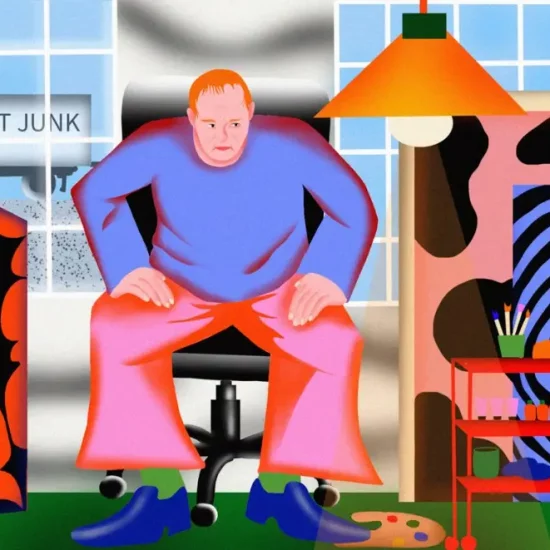With a world in crisis and an art market spinning out of control, ace art-world consultants Chen & Lampert deliver hard truths in response to questions sent by Art in America readers from far and wide.
I lost the lease on my studio and can’t afford another in today’s market. There is half a room at home that I can take over, but it isn’t big enough to both work in and store all my art. My wife is suggesting that I have a sale on Instagram, but I don’t want to give the impression of being desperate or cheap. My only other option is to discard a lot of art since I don’t have space or money to keep it all anymore. The idea of doing this depresses me to no end. What should I do?
Your depression must be deeply debilitating because we are experiencing serious secondhand fatigue trying to gloss up an answer that won’t hurt your feelings. The loss of your studio has forced you to reckon with a chilling reality that every financially strapped creative spirit must eventually face: all art is landfill unless someone cherishes it. Love might be a lot to ask for, but, luckily, people, especially family members, also hold onto art because of guilt. Take solace in knowing that the canvases you don’t trash will eventually be the storage headache of your beloved wife or a grieving friend you appoint in your elaborate will.
Never forget that in the world of collecting, you are the biggest collector of your own art. No one has a collection as encyclopedic as yours. The problem with monopolizing your own market is that other potentially interested parties cannot consider its aesthetic, cultural, or financial value. We don’t know your background: perhaps you are represented by a gallery, and maybe your work has sold in the past. If so, you might be justified in not wanting to offer these works up as BOGO specials on your socials. That said, if you haven’t sold much work and are not currently (or ever) showing in galleries, it doesn’t feel like a fire sale would tank your career. Your pride may be knocked a little, but this could also open up a door, or at least reduce clutter.
Has anyone ever said anything nice about your art? Congrats to them—now they get to own a piece of it. Share both the care and the burden with those who have bare walls and empty basements. Think of your family, friends, coworkers, colleagues, and acquaintances as your elite new patrons and benefactors. They won’t be paying for your work, but they will be saving you money that would otherwise get blown on storage and therapy bills.
I made a social media gaffe that is affecting my career. There was a thing going around about posting a photo of yourself at 21. My friend from college sent a picture of us at that age, so I put it on my X feed. We’re giving the thumbs-up sign while eating sandwiches outside a falafel restaurant. I swear I didn’t even notice the Israeli flag in the background. The blowback that this picture has provoked is troubling. People are accusing me of being an occupier, while others are cheering my patriotism! Two upcoming studio visits were canceled, and I was rejected by an art auction to support Gaza. It was an honest mistake and doesn’t represent how I feel about this humanitarian crisis. How do I get myself out of the conversation and back on track?
Your love of tahini, pickles, salad, and chickpeas has transformed your generously stuffed vegetarian pita into a blistering lamb meatball. You know what these two delicacies have in common? They both squirt out fluids that get all over your face and stain your shirt. You know what else is really messy? Life in 2024. Social media is capable of dredging up damning incidents from your past alongside new problems that can be sparked by offensive food posts and lame AF memes. This is the price we pay as a society for quick-like ASMR mukbang food videos, Leaning Tower of Pisa selfies, open-letter shares, and late-night thirst traps. Regardless of your affiliation, stop food blogging, and no more low-key virtue-signaling posts—both may unconsciously betray your disingenuous hunger for bipartisan hummus and nonbinary biennials. Consider the real pain of others in the world while keeping in perspective how much you are irritating some art people with your dumb posts.
Your queries for Chen & Lampert can be sent to hardtruths@artinamericamag.com

